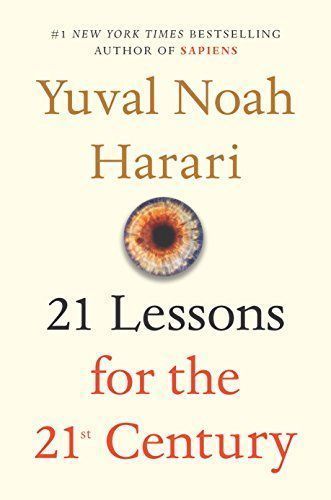
21 Lessons for the 21st Century
In Sapiens, he explored our past. In Homo Deus, he looked to our future. Now, one of the most innovative thinkers on the planet turns to the present to make sense of today's most pressing issues. How do computers and robots change the meaning of being human? How do we deal with the epidemic of fake news? Are nations and religions still relevant? What should we teach our children? Yuval Noah Harari's 21 Lessons for the 21st Century is a probing and visionary investigation into today's most urgent issues as we move into the uncharted territory of the future. As technology advances faster than our understanding of it, hacking becomes a tactic of war, and the world feels more polarized than ever, Harari addresses the challenge of navigating life in the face of constant and disorienting change and raises the important questions we need to ask ourselves in order to survive. In twenty-one accessible chapters that are both provocative and profound, Harari builds on the ideas explored in his previous books, untangling political, technological, social, and existential issues and offering advice on how to prepare for a very different future from the world we now live in: How can we retain freedom of choice when Big Data is watching us? What will the future workforce look like, and how should we ready ourselves for it? How should we deal with the threat of terrorism? Why is liberal democracy in crisis? Harari's unique ability to make sense of where we have come from and where we are going has captured the imaginations of millions of readers. Here he invites us to consider values, meaning, and personal engagement in a world full of noise and uncertainty. When we are deluged with irrelevant information, clarity is power. Presenting complex contemporary challenges clearly and accessibly, 21 Lessons for the 21st Century is essential reading.
Reviews
Cassandra Tang@tangaroo
Elisavet Rozaki @elisav3t
Liam Richardson@liamactuallyreads
Amena Elkayal@amena_elkayal
Jeffrey Jose@jeffjose
Lord Aragorn@lordaragorn
Landon Alder@landonalder
Nelson Zagalo@nzagalo
Mounir Bashour@bashour
Angel Martinez@angxlmartinez
Kyle S@kylesq9
Tyler Urquhart@tylerurquhart
Mirella Hetekivi@euphoricdopamine
Hazal Özlem@sirunmanug
Max Bodach@maxbodach
Caroline Lewicki@clewicki20
Safiya @safiya-epub
Bryan Maniotakis@bryanmanio
Diana Platgalve@dianaplatgalve
Elena Garcia Navarro@elenagn
Ivaylo Durmonski@durmonski
Heather@heidens
Jeremy Cote@cote
Joe Zimet@jz
Highlights
Cassandra Tang@tangaroo
Cassandra Tang@tangaroo
Cassandra Tang@tangaroo
Cassandra Tang@tangaroo
Cassandra Tang@tangaroo
Cassandra Tang@tangaroo
Cassandra Tang@tangaroo
Cassandra Tang@tangaroo
Cassandra Tang@tangaroo
Cassandra Tang@tangaroo
Cassandra Tang@tangaroo